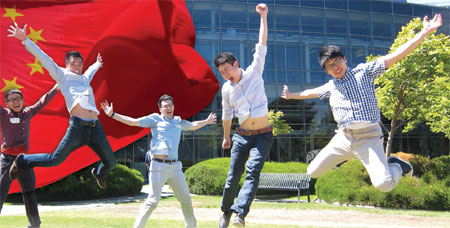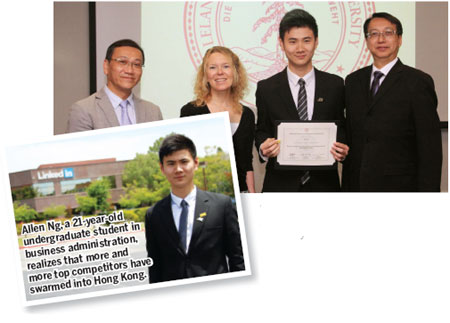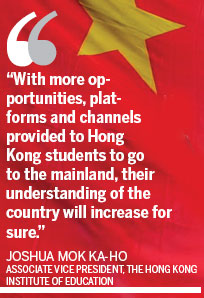Return to the lost horizon
Updated: 2013-08-30 07:43
By Andrea Deng(HK Edition)
|
|||||||



Many young people in Hong Kong are looking northward seeking new horizons for the future in the land of their forefathers and the wellspring of their culture. Andrea Deng writes.
Allen Ng is an ambitious young Hong Konger who knows where he is going. An undergraduate in business administration at the Chinese University of Hong Kong, Ng exudes warmth, smiles easily, has the "gift of the gab," and travels in wide social circles with an aura of supreme self-confidence.
He has many pursuits: leader of student clubs and university societies, participant in a program about social media at Stanford University, visiting top Internet companies. At 21, he's clearly set himself apart as a risk taker, co-running two start-up companies.
Last summer, he took an internship as an investment researcher at a securities company in Shenzhen, as he knows that knowledge of the mainland is essential for those determined to take full advantage of the opportunities.
He was born in Fujian and spent his first seven years there. Sometimes, he'd go back there on business trips with his father, after the family moved to Hong Kong. But he doesn't feel at all like he's well equipped to make his way through the mainland business culture.
"I had to go and experience what the business environment was like on the mainland," he said. "I also wanted to know if it is true what people are saying, that Shenzhen is catching up with Hong Kong."
It was only a one-month internship in Shenzhen, and just a small window of opportunity but a good start for him to learn about the working environment across the border. He didn't feel much culture shock and there was the opportunity to meet people from other provinces, get to know them, work with them.
But more importantly, he also got a read of the talent pool over the border and got a better idea of what the "competition" would be like.
"One of my tutors there was a Chicago University graduate and another was a Columbia University graduate. There was also another intern from the mainland who graduated from the University of Toronto. We used to think that it is almost like a privilege that Hong Kong should produce the professionals. It may not be our sole privilege any more," said Ng.
He had a mentor - who told Ng he thinks Hong Kong's future as a financial center may be called into question. The potential for the huge development at Qianhai in Shenzhen is so vast, he told Ng, that it could eclipse Hong Kong within a decade.
Ng is reserving judgment on that but still - he voices amazement at just how fast Shenzhen is growing. That reinforced his conviction that Hong Kong students need to be up on their toes and ready to move wherever the action demands.
"You have no choice, one must be practical, be open-minded, and step up. Otherwise, you'll lose some opportunities. You might be less competitive," Ng added.
Answering the faraway voice
In recent years, more and more Hong Kong students are heading north on short term study tours, exchange programs, or internships to accumulate as much knowledge and experience about the mainland as they can.
The trend is being encouraged by an increasing number of opportunities. Some are offered by the SAR government. Different organizations, networks, schools and universities are sponsoring programs.
The Chinese University of Hong Kong (CUHK) has a number of programs that can connect students with networks of mainland companies.
About 1,450 students from CUHK participated in internships or exchange programs on the mainland in the 2009-2010 school year. In 2011-2012, the number swelled to about 2,000.
All this northbound traffic heading out of the city may be a sign that Hong Kong students are losing their supreme sense of superiority, says Joshua Mok Ka-ho, associate vice president of the Hong Kong Institute of Education. One of Mok's research fields has been Greater China studies.
"That would be a good thing. Because if people start to worry, the society as a whole will respond, and will advance from that," said Mok.
Meanwhile, there have been all sorts of study tours under the "Community Participation Scheme for Organizing Study Tours to the Mainland". The scheme was organized by the Commission of Youth to process applications for government subsidies for these tours. According to the commission, about 26,300 students or young people in Hong Kong have been or will be sponsored by the government to participate in study tours or take internships on the mainland from 2011 to 2014.
There are many study tours - most short term and confined to one subject - art and culture in Shanghai, environmental conservation and ethnic minorities in Inner Mongolia, volunteer projects in Yunnan province, exploring old cities in Sichuan or even visiting and talking to migrant workers in Guangdong province.
Much as these experiences are short term, they provide significant learning experiences for young people from Hong Kong who have never been to the mainland.
"With more opportunities, platforms and channels provided to Hong Kong students to go to the mainland, their understanding of the country will increase for sure," said Mok.
"In recent years, Hong Kong people have learned much about the growing wealth of the mainland, or about the objectionable conduct of some mainland tourists. But we need to see things objectively. You have to understand things before you make any judgment. You have to have first-hand experiences before you comment," he said.
"(For these study tours,) at least the Hong Kong students will learn that China does not equal only Shanghai or Guangzhou, and that it is a big country with huge diversity and complexity," said Mok.
But it is not uncommon that some have very limited knowledge about their motherland.
"(Before they went to China,) their perception was that a lot of Chinese people are uncivilized and do not follow any rule. Some of them were even afraid that they might have their kidneys cut off just hanging out in Shenzhen for eateries," Ng talked about some of his friends' experiences.
Reluctant pilgrims
For many of Hong Kong's young people, the journey north remains a reluctant pilgrimage, but one seen increasingly as a must. It means the accumulation of knowledge likely to be essential for future success.
"My mentor told me that the most important thing is to show that you are not resisting the idea of working on the mainland," said Ng.
Some don't think it's important to accumulate experience across the border. Ng says many of his peers would far more eagerly grasp internship opportunities in Japan or Singapore than on the mainland.
Roy Chan Chu-kin, a student major in quantitative finance and risk management at CUHK, shared some of Ng's perceptions. Some of his classmates never thought of seeking opportunities on the mainland just because they didn't like the way some mainlanders behave.
Chan took an internship in Changsha, Hunan province last month. He also observed that young mainland professionals are catching up fast and ready to mount stiff competition to their Hong Kong counterparts. Even when it comes to mastery of English, or having an international perspective vision - two of the areas where Hong Kong students traditionally have taken a great sense of superiority - the mainland students are right there, and may even surpass many of their Hong Kong contemporaries, he noted.
"The duration of the internship was just too short. I don't think I'm better than my peers in Hong Kong (in knowledge of the country) just because I took an internship on the mainland. And I don't think I'll be in a better position to compete with mainland talents either, because, after all, you need a strong network if you're going to work on the mainland," said Chan.
Ng believes that to understand China one needs to read more from diversified sources of newspapers, magazines or online information, so that one can understand the things they see and experience it on the mainland.
"A lot of my friends read about the country just from Facebook or Apple Daily. What they get are just scattered fragments of things," he said.
Contact the writer at
andrea@chinadailyhk.com
(HK Edition 08/30/2013 page2)